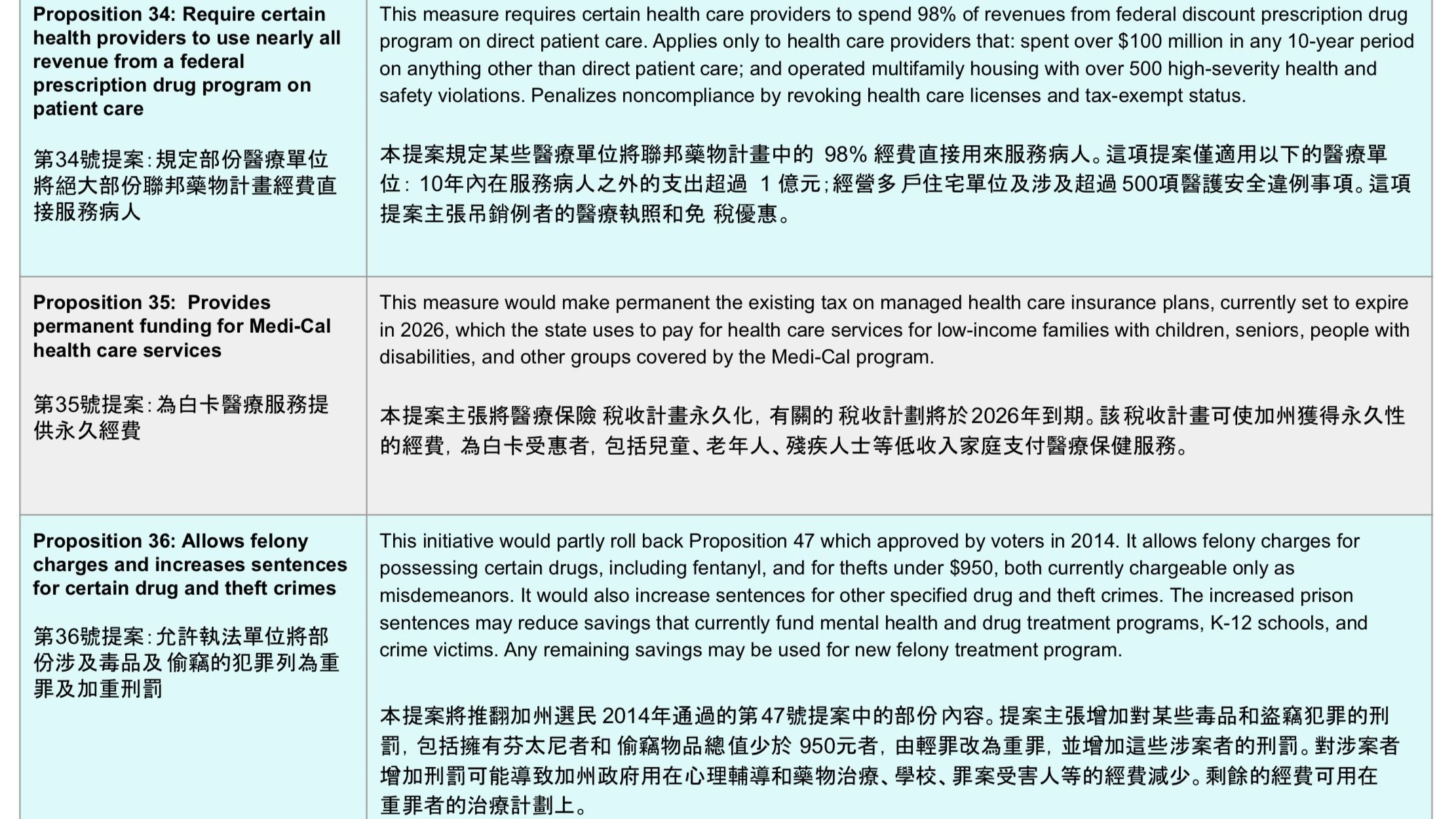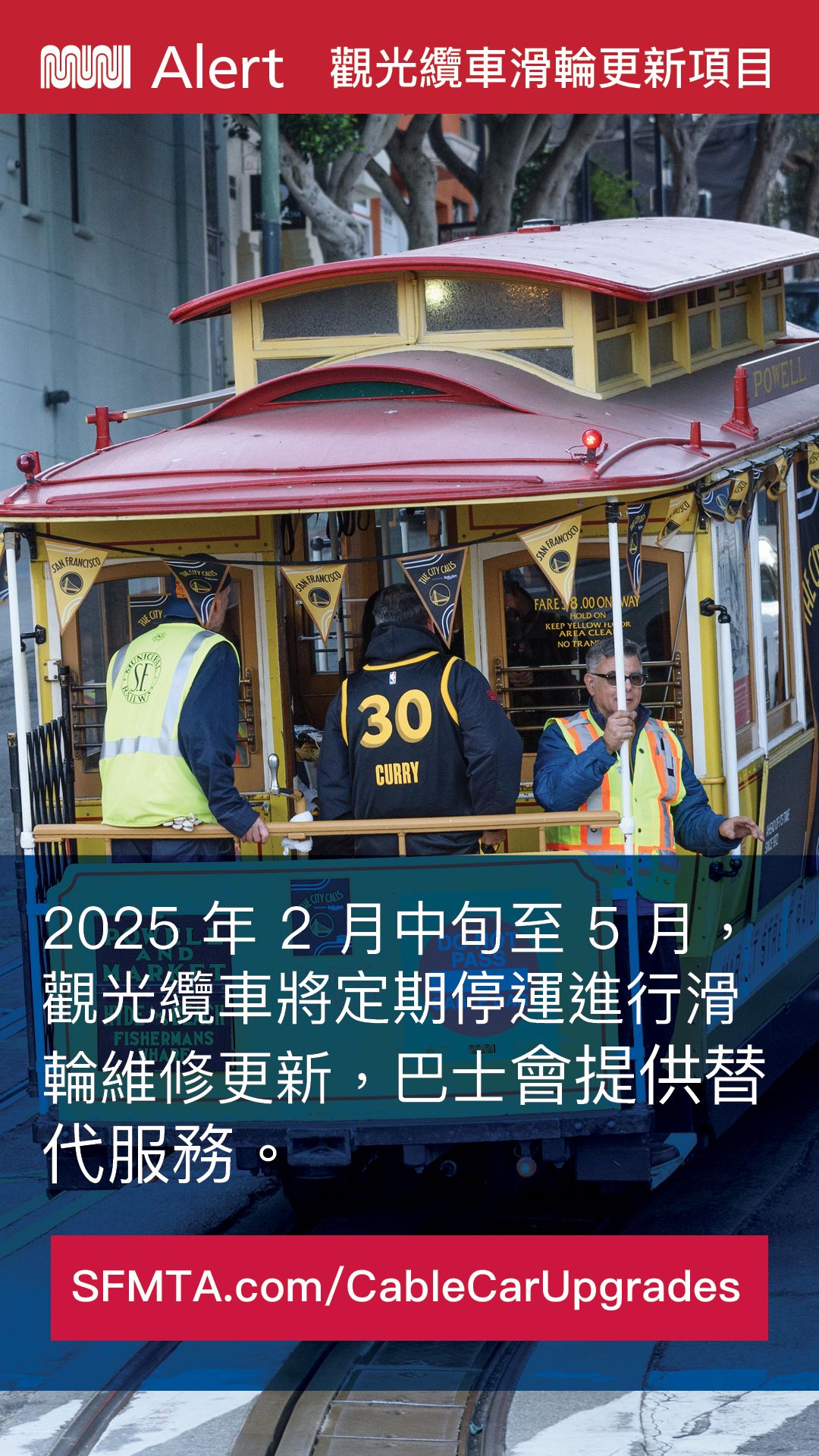10 ballot measures to be voted by California voters in November election


(SACRAMENTO) California Secretary of State Shirley Weber announced on July 3 that 10 qualified ballot measures were assigned with proposition numbers for voters to decide on the November 5 election. Proposition 36 which is aimed to partly rewrite Proposition 47 is expected to be the most contentious state measure and widely supported by the Asian voters.
Weber also invited interested Californians to submit arguments for 10 state propositions to be considered for inclusion in the Official Voter Information Guide. The guide will be mailed to all voting households in California and posted on the Secretary of State’s website.
Among 10 state initiatives on the November ballots, five of them are citizen initiatives by collecting signatures to make them qualified for the ballots. Those initiatives include Proposition 32 to raise the statewide minimum wage to $18 an hour; Proposition 33 to expand local government authorities in passing rent control laws; Proposition 34 to impose regulations on health care providers; Proposition 35 to provide permanent funding for Medi-Cal programs; and Proposition 36 to enhance sentences for drug and theft crimes.
The state legislature voted to approve an additional three constitutional amendments and two bond measures for statewide ballots in the November election.
Three measures to amend the California Constitution include Proposition 3 to permanently establish a right for same-sex couples to marry and repeal Proposition 8 which was passed by voters in 2008 and was later overturned in court; Proposition 5 to lower the vote threshold from 2/3 (66.67%) to 55% for local special taxes to fund housing projects and public infrastructure; and Proposition 6 to prohibit slavery in any form and limit forced labor in prisons.
Two bond measures are Proposition 2 to fund the K-12 and community colleges for constructions and modernizations, and Proposition 4 to finance projects for safe drinking water, wildfire prevention and climate solutions. Both bond measures are $20 billion in total and $10 billion for each.
Proposition 36 will amend some penal codes in California related to Proposition 47 which was passed by voters in 2014. During the past 10 years, opponents of Proposition 47 and business community have criticized the measure, which reclassified certain crimes like thefts of items under $950 from felonies to misdemeanors, has led to an increase in auto thefts and shoplifting offenses that also have created a crisis of retail thefts in California.
Members of the Asian community have been critical of Proposition 47 for leading to a portion of anti-Asian hate related vandalisms and thefts. It is expected that Proposition 36 will be supported among Asian voters.
10 qualified state measures are listed in the followings:
Proposition 2: $10 billion bond to build schools
State Legislature approved AB 247 for a ballot measure to set forth the kindergarten through Grade 12 schools and local community colleges in public school system to modernize and repair school facilities. As a state bond act that would provide $8.5 billion for K-12 schools and $1.5 billion to community colleges.
Proposition 3: Reaffirm the right of same-sex marriage in the California Constitution
The California Constitution provides that only a marriage between a man and a woman is valid or recognized in California, and federal law permanently enjoins the state from enforcing this constitutional provision. This measure would repeal the unenforceable constitutional provision and would instead provide that the right to marry for same-sex couples is a fundamental right, as specified.
Proposition 4: $10 billion bond for climate programs
This measure, SB 867, would enact the Safe Drinking Water, Wildfire Prevention, Drought Preparedness, and Clean Air Bond Act of 2024 to authorize the issuance of $10 billion bonds to finance projects for safe drinking water, drought, flood, water resilience, nature-based climate solutions, and clean air programs.
Proposition 5: Lower voter approval requirements for local housing and infrastructure bonds from 2/3 to 55%
This measure is to amend the California Constitutional to make it easier for local governments to borrow money for affordable housing and other infrastructure. Local governments would be able to impose special taxes for affordable housing related projects if 55% of the local voters approve upon the tax measures instead of the requirement of 2/3 of the voters.
Proposition 6: Limit forced labor in state prisons
The California Constitution prohibits slavery and involuntary servitude, except as punishment to a crime. This measure is to amend the State Constitution that would instead prohibit slavery in any form and prohibit the Department of Corrections and Rehabilitation from disciplining any incarcerated person for refusing a work assignment.
Proposition 32: Raise the state minimum wage to $18 an hour
Existing law requires annual increases to California’s minimum wage until it has reached $15.00 per hour for all businesses on January 1, 2023. Currently, $15.00 per hour for businesses with 26 or more employees, and $14.00 per hour for smaller businesses. This measure extends these annual increases ($1.00 per year) until minimum wage reaches $18.00 per hour. Thereafter, the minimum wage will annually be adjusted for inflation.
Proposition 33: Expand local governments to impose rent controls on residential properties
Current state law (the Costa-Hawkins Rental Housing Act of 1995) prevents cities and counties from limiting the initial rental rate that landlords may charge to new tenants in all types of housing, and from limiting rent increases for existing tenants in residential properties that were first occupied after February 1, 1995; single-family homes; and condominiums. This measure would repeal that state law and would prohibit the state from limiting the right of cities and counties to maintain, enact, or expand residential rent-control ordinances.
Proposition 34: Require certain health providers to use nearly all revenues from a federal prescription drug program on patient care
This measure requires certain health care providers to spend 98% of revenues from federal discount prescription drug program on direct patient care. Applies only to health care providers that: spent over $100 million in any 10-year period on anything other than direct patient care; and operated multifamily housing with over 500 high-severity health and safety violations. Penalizes noncompliance by revoking health care licenses and tax-exempt status.
Proposition 35: Provides permanent funding for Medi-Cal health care services
This measure would make permanent the existing tax on managed health care insurance plans, currently set to expire in 2026, which the state uses to pay for health care services for low-income families with children, seniors, people with disabilities, and other groups covered by the Medi-Cal program.
- In a 52-2 vote, Chinese American Democratic Club endorses to recall Supervisor Engardio as a result of passage of Proposition K
- An amnesty program in San Francisco is back through July 1, 2025 to legalize existing awnings
- Opinion: Political betrayal warrants recall
- Do empty yellow loading zones best serve the San Francisco Chinatown community?
- T&T Supermarket, largest Asian grocery chain in Canada, announces to open at San Francisco City Center on Geary Blvd. in winter 2026
- (Breaking news: Charlene Wang wins in the Oakland's special election) Charlene Wang runs for Oakland District 2 Councilmember on April 15, 2025 to represent Oakland Chinatown
- Mayor Lurie announces plans to support small businesses including First Year Free program waiving fees for new businesses
- 12 speed safety camera systems out of 33 begin to operate in San Francisco by first issuing warnings instead of citations for 60 days






